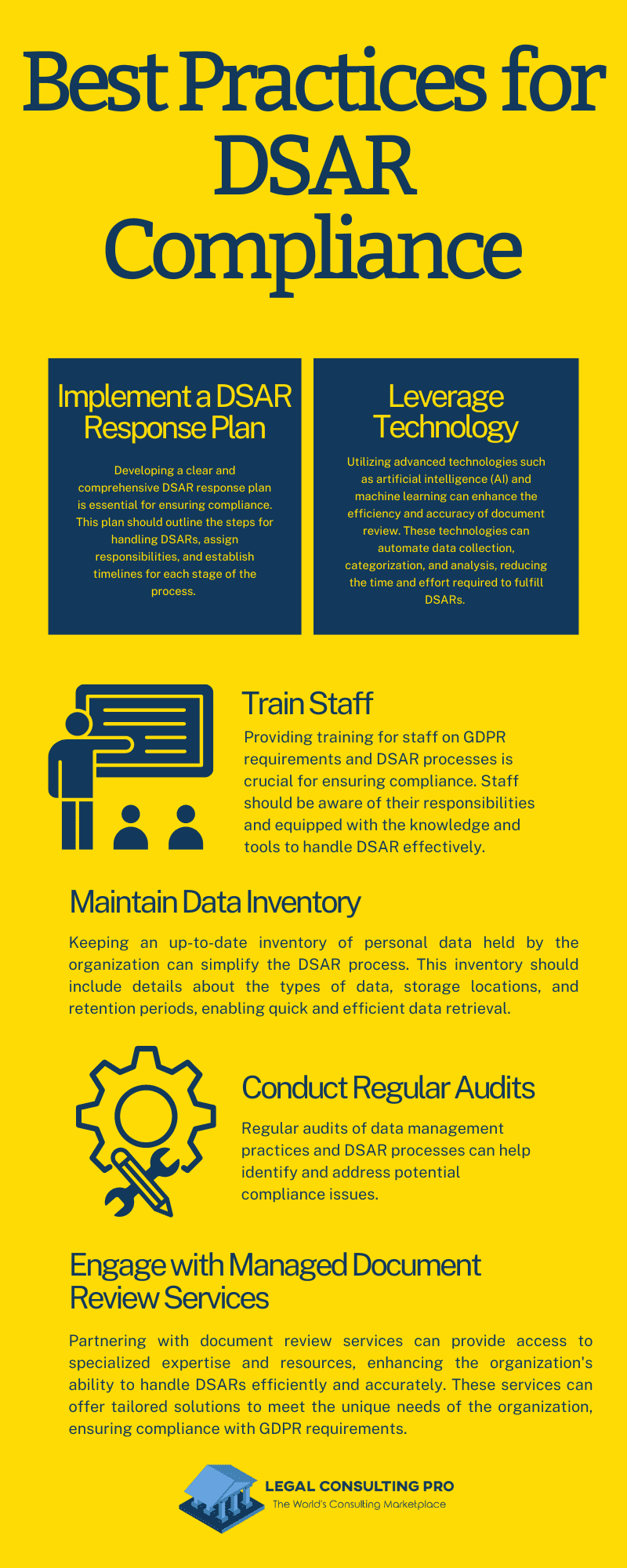The General Data Protection Regulation (GDPR) has profoundly impacted how organizations handle personal data. One of the critical aspects of GDPR is the Data Subject Access Request (DSAR), which empowers individuals to obtain a copy of their personal data held by an organization. Compliance with Data Subject Access Request (DSAR) is essential for data controllers, and the role of managed document review is crucial in fulfilling these requests efficiently and accurately. This article delves into the intricacies of DSARs and the GDPR, highlighting the legal obligations of data controllers and the importance of document review.
Understanding Data Subject Access Request (DSAR) under GDPR
What is a DATA SUBJECT ACCESS REQUEST (DSAR)?
A Data Subject Access Request (DSAR) is a request made by an individual to a data controller to access personal data that the controller holds about them. Under GDPR, individuals have the right to know:
- What personal data is being processed?
- The purposes for which the data is being processed.
- The categories of personal data concerned.
- The recipients or categories of recipients to whom the data has been or will be disclosed.
- The envisaged period for which the personal data will be stored.
- The existence of the right to request rectification, erasure, or restriction of processing of personal data.
- Information about the source of the data if it was not collected directly from the data subject.
- The existence of automated decision-making, including profiling.
Legal Obligations for Data Controllers
Data controllers are obligated to respond to Data Subject Access Request (DSAR) within one month of receipt, although this period can be extended by two months in cases of complex or numerous requests. Failure to comply with DSARs can result in significant fines and reputational damage. Here are the key legal obligations for data controllers concerning DSARs:
- Verification of Identity: Before fulfilling a DSAR, data controllers must verify the identity of the requester to prevent unauthorized data access.
- Comprehensive Data Search: Data controllers must search all relevant systems and databases to gather the requested personal data. This process often involves a thorough managed document review to ensure completeness and accuracy.
- Provision of Data: Personal data must be provided in a commonly used and machine-readable format, ensuring the data subject can understand and use the information effectively.
- Transparency and Clarity: Data controllers must provide information in a concise, transparent, intelligible, and easily accessible form, using clear and plain language.
- Free of Charge: Generally, data controllers cannot charge a fee for providing the requested information unless the request is manifestly unfounded or excessive.
The Role of Managed Document Review in DSAR Compliance
Importance of Document review
Managed document review is a systematic approach to handling large volumes of documents and data, ensuring that the review process is efficient, accurate, and compliant with legal requirements. In the context of Data Subject Access Request (DSAR), document review plays a crucial role in:
- Efficiency: Managed document review services help data controllers handle DSARs promptly, meeting the stringent timelines set by GDPR.
- Accuracy: Expert review teams ensure that all relevant personal data is identified and included in the response, minimizing the risk of omissions or errors.
- Consistency: Document review ensures that responses to Data Subject Access Request (DSAR) are consistent and comprehensive, adhering to the legal obligations under GDPR.
Steps in Managed Document Review for Data Subject Access Request (DSAR)
- Initial Assessment: The document review team conducts an initial assessment of the DSAR to understand the scope and requirements. This involves identifying the data subject and the specific data requested.
- Data Collection: The team gathers all relevant personal data from various sources, including emails, databases, and physical documents. Advanced search techniques and technologies are used to ensure a thorough data collection process.
- Data Processing: Collected data is processed and organized systematically. This step involves filtering out irrelevant information and categorizing the data for easier review.
- Review and Analysis: Expert reviewers analyze the processed data to identify the specific personal data requested in the DSAR. This step ensures that only the relevant data is included in the response.
- Quality Control: A quality control check is performed to verify the accuracy and completeness of the data. Any discrepancies or issues are addressed before finalizing the response.
- Response Preparation: The reviewed data is compiled into a comprehensive response, ensuring that it meets the requirements of GDPR. The response is then provided to the data subject in a commonly used and machine-readable format.
Challenges in Fulfilling DSARs
Volume and Complexity of Data
Organizations often hold vast amounts of personal data across multiple systems and formats, making it challenging to identify and compile all relevant information for a DSAR. Managed document review helps address this challenge by using advanced search and categorization techniques to streamline the process.
Data Privacy and Security
Ensuring the privacy and security of personal data during the DSAR process is critical. Document review services implement robust security measures to protect sensitive information and prevent unauthorized access.
Resource Constraints
Fulfilling Data Subject Access Request (DSAR) can be resource-intensive, particularly for organizations with limited staff or expertise in data management. Document review provides access to skilled professionals and advanced technologies, reducing the burden on internal resources.
Legal and Regulatory Compliance
Navigating the complex legal and regulatory landscape of GDPR compliance requires specialized knowledge and expertise. Managed document review services to ensure that DSAR responses adhere to legal requirements, minimizing the risk of non-compliance.
Best Practices for DSAR Compliance
Implement a DSAR Response Plan
Developing a clear and comprehensive DSAR response plan is essential for ensuring compliance. This plan should outline the steps for handling DSARs, assign responsibilities, and establish timelines for each stage of the process.
Leverage Technology
Utilizing advanced technologies such as artificial intelligence (AI) and machine learning can enhance the efficiency and accuracy of document review. These technologies can automate data collection, categorization, and analysis, reducing the time and effort required to fulfill DSARs.
Train Staff
Providing training for staff on GDPR requirements and DSAR processes is crucial for ensuring compliance. Staff should be aware of their responsibilities and equipped with the knowledge and tools to handle Data Subject Access Requests (DSAR) effectively.
Maintain Data Inventory
Keeping an up-to-date inventory of personal data held by the organization can simplify the DSAR process. This inventory should include details about the types of data, storage locations, and retention periods, enabling quick and efficient data retrieval.
Conduct Regular Audits
Regular audits of data management practices and DSAR processes can help identify and address potential compliance issues. These audits should assess the effectiveness of managed document review services and ensure that the organization is meeting its legal obligations under GDPR.

Engage with Managed Document Review Services
Partnering with document review services can provide access to specialized expertise and resources, enhancing the organization’s ability to handle DSARs efficiently and accurately. These services can offer tailored solutions to meet the unique needs of the organization, ensuring compliance with GDPR requirements.
Conclusion
Compliance with Data Subject Access Request (DSAR) is a fundamental obligation for data controllers under GDPR, requiring careful management and meticulous attention to detail. Managed document review plays a critical role in fulfilling these requests, offering efficiency, accuracy, and consistency in the review process. By leveraging document review services and adhering to best practices, organizations can navigate the complexities of DSAR compliance, safeguarding the rights of data subjects and mitigating the risks of non-compliance.
In the evolving landscape of data privacy and protection, understanding the legal obligations of DSARs and the importance of managed document review is essential for data controllers. As regulatory scrutiny intensifies, organizations must remain vigilant and proactive in their approach to DSAR compliance, ensuring that they meet the expectations of both the law and the individuals whose data they hold.
Similar blogs:
Challenges in Fulfilling Data Subject Access Request (DSAR): Balancing Transparency and Data Privacy
Demystifying Predictive Coding: How AI Revolutionizes Managed Document Review







































